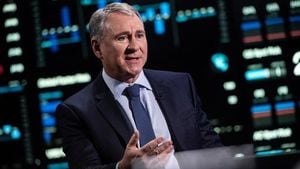The German economy, once touted as the powerhouse of Europe, is now grappling with stagnation and political turbulence. Recent economic indicators reveal significant challenges, culminating in downgrades of growth forecasts and considerable declines in key sectors. Amid this backdrop, German Chancellor Olaf Scholz has made waves by dismissing his finance minister, Christian Lindner, following tensions within the ruling coalition, prompting concerns about the stability of the government.
The latest figures released by the Federal Statistical Office, or Destatis, indicate the German economy grew just 0.1% compared to the previous quarter. This disappointing performance falls short of analysts' expectations which had predicted growth of 0.2%. This narrow margin suggests Germany narrowly avoided entering recession territory, defined by two consecutive quarters of negative growth, but it also highlights the fragility of its economic recovery.
Household consumption showed only modest improvement, increasing by 0.3%. Surprisingly, government spending rose slightly by 0.4%, reflecting the coalition's attempt to stimulate the economy amid rising inflation and cost-of-living pressures. Nevertheless, the substantial decline of 2.4% in exports of goods signals serious trouble for Germany, a country deeply reliant on trade.
The manufacturing sector, instrumental to the German economy, has been particularly hard hit by global economic changes. A combination of supply chain disruptions from the COVID-19 pandemic, rising energy costs, and the war in Ukraine has left many companies struggling. Volkswagen, one of the nation’s most iconic brands, announced cost-cutting measures including potential plant closures and job losses, underlining the precarious state of industrial stability.
Scholz's government, formed by the Social Democrats (SPD), Greens, and the Free Democratic Party (FDP), has encountered frequent tensions, particularly around budgetary discipline and social spending. Scholz's recent sacking of Lindner—who had been pursuing stringent fiscal policies—illustrates these fractures. The FDP’s insistence on maintaining strict fiscal discipline has clashed with calls from the SPD and Greens for greater public investment, particularly to address pressing social challenges and climate change commitments.
This political discord has broader implications. The leaked policy paper from Lindner proposing major reforms to Germany's economic strategies has highlighted rifts within the coalition. Lindner’s proposals rejected foundational elements of state-sponsored welfare and climate action, igniting fierce debates over Germany’s economic direction. After weeks of flux, it was revealed the SPD and Greens would now lead as a minority government, setting the stage for early elections likely to take place on February 23, 2025.
Political instability accompanies economic trials, as public sentiments sway against the ruling coalition. The recent internal strife has become evident among constituents supporting the right-leaning Alternative for Germany (AfD) party, which has gained traction by challenging mainstream narratives around immigration and economic management. Polling shows the AfD has begun to resonate with voters, reflecting widespread discontent with the current framework of political governance.
Beyond immediate economic woes, the political climate is also tinged with longer-term concerns about the very nature of German democracy. The AfD's rise can be correlated with significant public unease over structural changes within the economy and the impact of globalization. Many German citizens feel left behind amid what they perceive as neglect from the traditional parties, particularly on issues of economic justice and social equity.
Inflation persists as another formidable challenge. Prices are climbing at rates not seen for decades, squeezing household budgets and dampening consumer confidence. Though inflation has dipped slightly lately, fights over issues tied to energy prices, supply chains, and the broader economic structure continue to echo throughout the country, leading to demands for wage increases and labor reforms.
Calls for budgetary reforms have emerged amid these mounting pressures. Critics have labeled recent government actions inadequate, arguing the administration's focus should shift toward stimulating domestic consumption rather than adhering rigidly to austerity measures. The broader consensus among economists suggests prioritizing investments to safeguard key industries is far more beneficial than merely balancing the budget.
Internationally, Germany’s standing has also taken hits due to foreign policy decisions, particularly its reliance on Russian energy resources prior to the invasion of Ukraine. This dependency has placed pressure on the economy, particularly as Germany shifts its political and economic alliances to align with the West amid rising tensions with Russia.
The future of Germany’s economy seems uncertain as it faces multiple intersecting crises: economic stagnation, political instability, and social unrest. The coalition government’s ability to navigate this complex environment remains under scrutiny, with increasing calls for more significant reforms to rebuild public confidence and stabilize the economy.
For many, the months leading up to the snap elections will be watched closely. Germany's next steps will be pivotal not only for its citizens but also for the entire European bloc, which often looks to Germany as its economic anchor. Whether this political upheaval translates to meaningful changes on the ground will depend largely on how effectively the SPD and Greens, potentially without the FDP, can communicate and execute viable policies to address the pressing concerns of the populace.
Germany’s cautionary tale, including the consequences of poor economic management and political disunity, offers lessons beyond its borders. The interplay between economic policy and political stability may prove as defining for Europe as any financial crisis or geopolitical conflict, influencing the future path of nations grappling with similar challenges.



